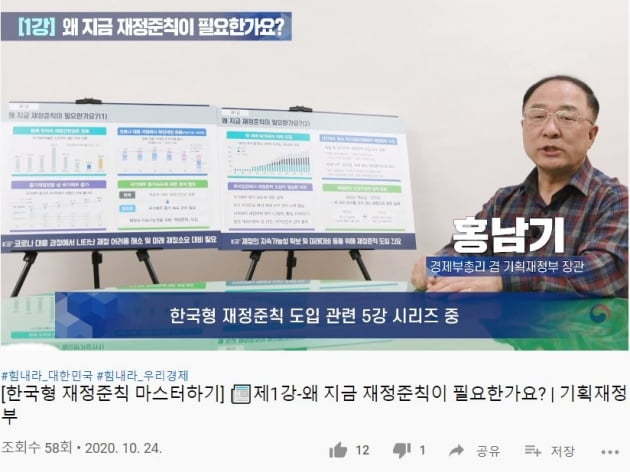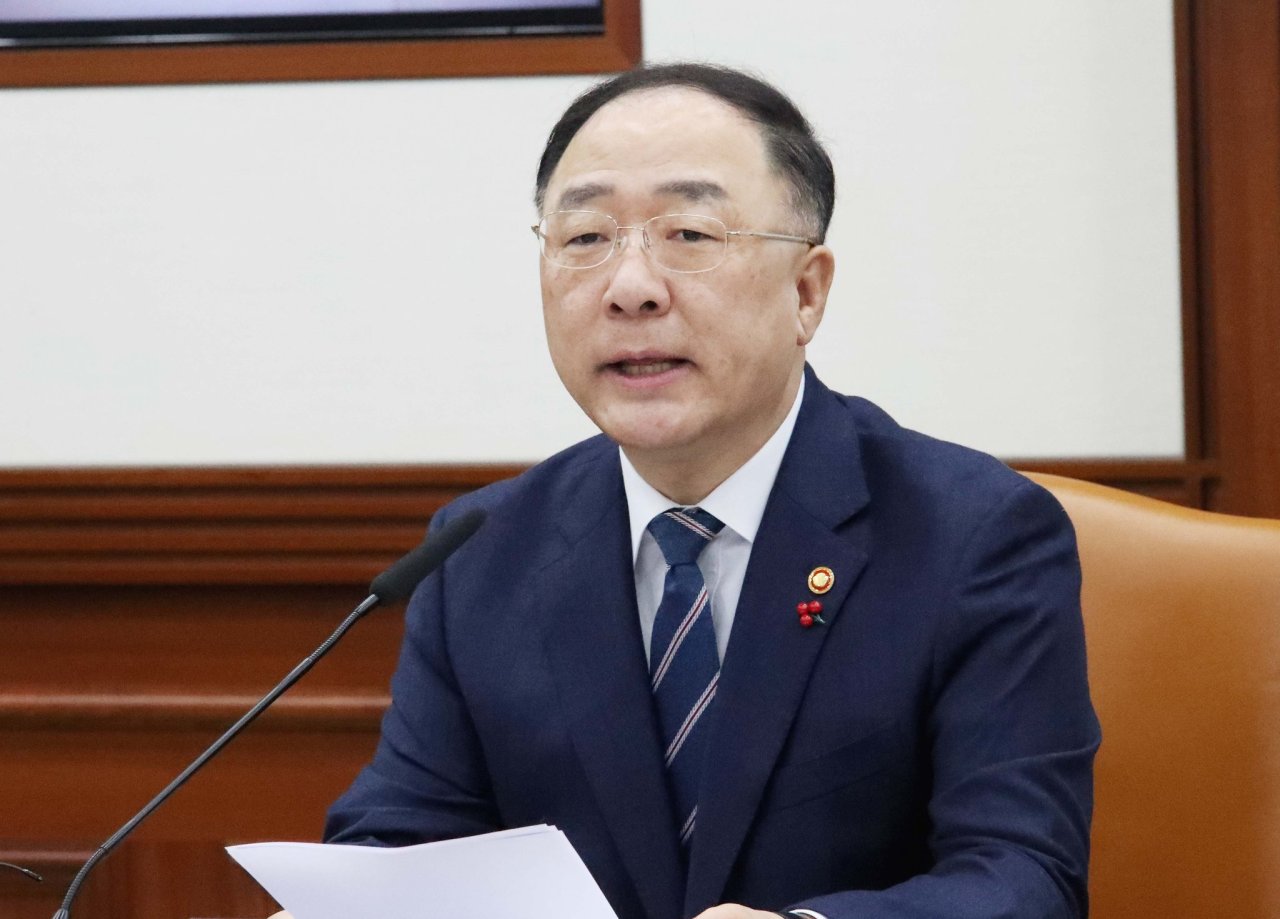Finance minister turns to YouTube to defend fiscal soundness
Architect behind government’s real estate countermeasures himself also becomes ‘jeonse’ refugee
By Jung Min-kyungPublished : Oct. 25, 2020 - 18:31

October has been a brutal month for South Korean Finance Minister Hong Nam-ki.
Amid heated public criticism against the government’s key fiscal decisions, Hong turned to YouTube on Saturday to defend the government’s fiscal soundness plan announced earlier this month, in a rare move as the top public official of the country.
The minister, wearing casual clothes, appeared in five videos explaining the “Korean fiscal soundness rules” to give a full picture of how the government made its decision in line with the global economic circumstances.
This was his second series of economy-related videos after the one last month in which he explained the domestic and global economy.
“On using the standard (that take the NPS assets) into account, the standard is globally accepted,” he explained. The standard, however, has been criticized for years for glossing over the nation’s net fiscal balance. At the moment, there are more people paying to the NPS rather than receiving the benefits, so the public fund’s assets are in the black -- which may change due the aging society.
Hong’s online lectures on YouTube aired weeks after an impromptu press meeting on Oct. 6, however, has drawn mixed reactions.
The plan -- announced Oct. 5 -- has been met with strong backlash due to its “loopholes,” which critics say defeated the purpose of the plan while allowing the government to spend taxpayers’ money too freely.
It aims to ensure the country’s fiscal soundness plans for 2025, drawing immediate flak from experts and public alike for its time frame -- which takes effect five years from now -- and for its lax rules. It also uses a fiscal balance standard that cuts the government more slack, as it takes assets from the National Pension Service into account, they say.
The Ministry of Economy and Finance said it aims to maintain the national debt-to-gross domestic product ratio below 60 percent and its consolidated fiscal balance at minus 3 percent in 2025. But exceptions can be made in “times of crisis,” like the current coronavirus pandemic.
Hong not only has been facing criticism on government’s fiscal soundness plan, he has also been enduring public attention about somewhat a private matter -- his residential condition.
It was revealed that the Moon Jae-in administration’s web of real estate rules, considered Hong’s brainchild, had ironically forced him to move out of his “jeonse” apartment in western Seoul.
Amid heated public criticism against the government’s key fiscal decisions, Hong turned to YouTube on Saturday to defend the government’s fiscal soundness plan announced earlier this month, in a rare move as the top public official of the country.
The minister, wearing casual clothes, appeared in five videos explaining the “Korean fiscal soundness rules” to give a full picture of how the government made its decision in line with the global economic circumstances.
This was his second series of economy-related videos after the one last month in which he explained the domestic and global economy.
“On using the standard (that take the NPS assets) into account, the standard is globally accepted,” he explained. The standard, however, has been criticized for years for glossing over the nation’s net fiscal balance. At the moment, there are more people paying to the NPS rather than receiving the benefits, so the public fund’s assets are in the black -- which may change due the aging society.
Hong’s online lectures on YouTube aired weeks after an impromptu press meeting on Oct. 6, however, has drawn mixed reactions.
The plan -- announced Oct. 5 -- has been met with strong backlash due to its “loopholes,” which critics say defeated the purpose of the plan while allowing the government to spend taxpayers’ money too freely.
It aims to ensure the country’s fiscal soundness plans for 2025, drawing immediate flak from experts and public alike for its time frame -- which takes effect five years from now -- and for its lax rules. It also uses a fiscal balance standard that cuts the government more slack, as it takes assets from the National Pension Service into account, they say.
The Ministry of Economy and Finance said it aims to maintain the national debt-to-gross domestic product ratio below 60 percent and its consolidated fiscal balance at minus 3 percent in 2025. But exceptions can be made in “times of crisis,” like the current coronavirus pandemic.
Hong not only has been facing criticism on government’s fiscal soundness plan, he has also been enduring public attention about somewhat a private matter -- his residential condition.
It was revealed that the Moon Jae-in administration’s web of real estate rules, considered Hong’s brainchild, had ironically forced him to move out of his “jeonse” apartment in western Seoul.

To curb speculative buying and so-called “gap investment,” the government recently revised the Housing Lease Protection Act, which capped increases on jeonse deposits at 5 percent and gave tenants the right to renew a standard two-year contract once, unless the landlords themselves intended to live on the property. Tenants can decide to exercise this right within six months of the jeonse contract’s expiration. Jeonse, Korea’s unique system, allows tenants to rent a home with a returnable lump-sum deposit instead of monthly rent.
Due to the revised law, Hong has to move out of his apartment in Mapo-gu, Seoul, where he lives as a tenant, as the homeowner has notified him of plans to move in.
Not only is he joining a wave of people looking for jeonse leases, half-jokingly called jeonse refugees, but Hong also failed to reclaim his own apartment in the sleepy city of Uiwang, Gyeonggi Province, as the current tenant has decided to exercise the right of jeonse renewal.
It is widely believed that the tenant had initially planned to move out at the end of the contract, but was unable to find another jeonse home due to the revised law.
The revised rules, in theory, should have protected tenants from the heated housing market and discouraged speculative buying. Instead it led to a nationwide jeonse housing shortage, as homeowners scrambled to reorganize their properties ahead of the law’s revision in July.
By Jung Min-kyung (mkjung@heraldcorp.com)
Due to the revised law, Hong has to move out of his apartment in Mapo-gu, Seoul, where he lives as a tenant, as the homeowner has notified him of plans to move in.
Not only is he joining a wave of people looking for jeonse leases, half-jokingly called jeonse refugees, but Hong also failed to reclaim his own apartment in the sleepy city of Uiwang, Gyeonggi Province, as the current tenant has decided to exercise the right of jeonse renewal.
It is widely believed that the tenant had initially planned to move out at the end of the contract, but was unable to find another jeonse home due to the revised law.
The revised rules, in theory, should have protected tenants from the heated housing market and discouraged speculative buying. Instead it led to a nationwide jeonse housing shortage, as homeowners scrambled to reorganize their properties ahead of the law’s revision in July.
By Jung Min-kyung (mkjung@heraldcorp.com)








![[Kim Seong-kon] Democracy and the future of South Korea](http://res.heraldm.com/phpwas/restmb_idxmake.php?idx=644&simg=/content/image/2024/04/16/20240416050802_0.jpg&u=)








![[KH Explains] Hyundai's full hybrid edge to pay off amid slow transition to pure EVs](http://res.heraldm.com/phpwas/restmb_idxmake.php?idx=652&simg=/content/image/2024/04/18/20240418050645_0.jpg&u=20240418181020)

![[Today’s K-pop] Zico drops snippet of collaboration with Jennie](http://res.heraldm.com/phpwas/restmb_idxmake.php?idx=642&simg=/content/image/2024/04/18/20240418050702_0.jpg&u=)